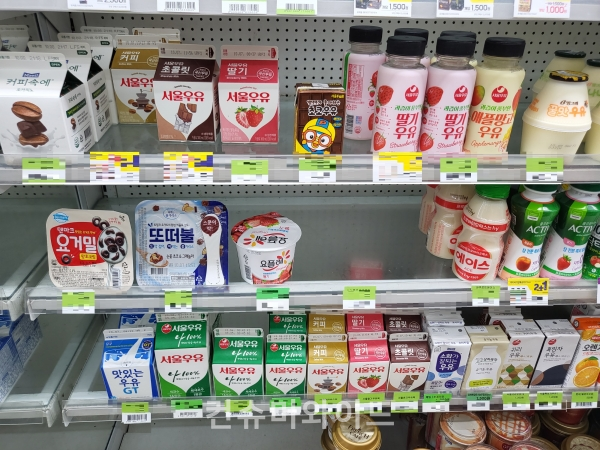
[Consumerwide_Jinil, Kang Reporter / Yohan, Bok Reporter] On the 16th, the electricity bill increased to 8 won for ㎾h. It was a day with early midsummer heat reaching 31.2 degrees during the daytime in Seoul. We are all desperately thinking about an air-conditioner, yet our hands refuse to press the button, worrying about the 'electricity bomb'. Not only the homes, but also small businesses are not free from electricity bombs.
Regular shopping districts with 10kW contracts pay an extra 9,060 won a month under the condition of using 1000kWh per month on average. In particular, places with 24 hours of business, including internet cafes and convenience stores, might be a heavy burden. Convenience stores handle fresh food products and frozen food products. Frozen foods are stored in a deep freezer, so it has no problem. But, the issue lies with fresh food products placed in the open-type refrigerator. Electricity is an enormous consumption even before the increase of the bill. For this reason, convenience stores are initiated to save expenses relative to electricity. One of the examples is changing the open-type refrigerator to a closed-type. When the refrigerator is changed to a closed type, they can reduce their electricity bill. The change from open-type to closed-type regarding refrigerators has begun in 2022. It has proved the efficiency of the electricity bill.
Lottemart received subsidies from Korea electric power Corp to replace the open-type of refrigerator with a closed-type in some branches from March 2022. Based on the record from last year, Lottemart is predicting that they estimate to save over 2.8 bn won a year by replacing refrigerators from open-type to closed-type. By using the closed-type of refrigerator, the waste rate of fresh food products has decreased by 12%. Based on the record, it's been proved that the closed-type is efficient in maintaining temperature. In mid-April, CU installed a closed-type of refrigerator in one of the branches of Seongdonggu, Seoul. Referring to the test, it's been proved that the open-type refrigerator is efficient in decreasing 63% of daily electricity consumption compared to the records in 2022. Thus, I perceive that convenience stores, including CU, had better hurry to change the refrigerator type to a closed one. CU should step forward till it expands to entire convenience stores in all the domestic area. All the worries about whether customers feel comfortable or not need to be rid of. If they exchange between values of 'saving energy' and 'one more sale', this could be one of the most inefficient deals. In former days, businesses had been passing on the rising cost of electricity bills to customers. Maybe this is the right time for change. Reducing electricity consumption can be beneficial for both business owners and customers. Businesses can save expenses and customers may have a chance to get money back, which money could be used for running the refrigerators (if the owner chooses to return the benefit to customers). The government may need to get involved clearly in progression. Nevertheless, purchasing at convenience stores and supermarkets with closed refrigerators can be considered as an act of environmental protection and value-consumption in the aspect of slowing down consumption. I want to voice out, "Now is the time for practicing value-consumption". If you reduce electricity expenses, (whether it returns to you or not), this will feed the earth.
- [Reporter's note] Cultural consumption and NunuTV, decisive action to turn away from the black market.
- [Reporter's note] As vegan turns to the trend, tons of private certifying companies began growing in Korea...Are their certification, trustworthy?
- [Reporter's note] Can probiotics consumption for your children be a value-consumption?
- [Reporter's note] Volkswagen, the first electric car in the domestic market, is having the second Recall...They have got to improve in quality, safety, and customer satisfaction.
- [Reporter's note] Vehicle tax changes on July 1st. Is it a reform or confusion?
- [Reporter's note] Consumers won't confide in humanless convenience stores any more, if they are handled carelessly...Food with too much E.coli and distribution of expired food
- [Reporter's Note] Light speed VS turtle speed; Reflecting raw material cost at different speeds in the food market..." Irrational pricing matter"
- [Reporter's Note] Smokeless "Dipping tobacco", why not in the domestic market?... Some see a low tax policy for "dipping tobacco" as worthwhile.
- [Reporter's note] Aspartame might be out of the market eventually, just like Parabens... We've got to check them out thoroughly concerning our body.
- [Reporter's Note] Time to wear masks again... Covid-19 pandemic in summer
- [Reporter's note] A culture of rest and recovery is necessary in the delivery industry.
- [Reporter's note] Another victim of SNS scams, including Tiffany&Co. jewelry (85% sales)... How long has the consumer got to endure alone?

